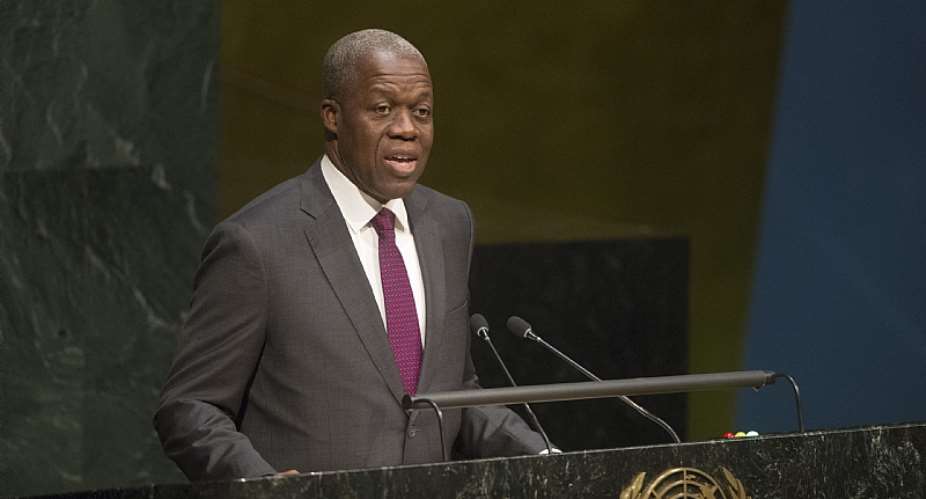Ghana has recorded significant progress over the last five years in the key target areas of ending HIV/AIDS.
Between 2009 and 2014, the country recorded a 30 per cent reduction in new HIV infections and a 43 per cent reduction in AIDS-related deaths.
Vice President Paa Kwesi Amissah-Arthur announced this today (June 8, 2016) when he presented the country’s National Progress Report at the High Level meeting on ending HIV/AIDS at the 70th session of the General Assembly at the United Nations headquarters in New York.
The three day meeting which began yesterday is undertaking a comprehensive review of the progress achieved in realizing the Declaration of Commitment on HIV/AIDS and the Political Declarations on HIV/AIDS of 2006, and 2011, successes, best practices, lessons learned, obstacles and gaps, challenges and opportunities, including with regard to partnership and cooperation, and recommendations to guide and monitor the HIV/AIDS response beyond 2015.
It is also looking at concrete strategies for action to end the AIDS epidemic by 2030 as well as to promote the continued commitment and engagement of leaders to accelerate a comprehensive universal and integrated response to HIV/AIDS.
The Vice President said that “Our government has demonstrated increasing ownership of the HIV response through advocacy, policy development and financial support that increased over 10-fold between 2011 and 2015.These, along with leadership commitments at various levels and across multiple actors, including civil society, the private sector and Development Partners have contributed to the progress”.
Civil Society and Community-based organizations have been remarkable in extending the reach and intensity of the national response to communities and vulnerable groups; he noted adding that the Global Fund, PEPFAR and UN System have also remained committed.
Current challenges in curbing the spread of the HIV infection, he said included the lack of comprehensive knowledge on HIV in the 15 to 24 age group, the persistence of stigma and discrimination, the fact that majority of Persons Living with HIV are not on treatment, women being disproportionately affected apart from the challenge posed by the sustained supply of HIV commodities.
Notwithstanding these, the Vice President maintained that “No one must be left behind”, explaining that ‘we are working to accelerate access to HIV testing and treatment toward the 90-90-90 target.
For now, Mr. Amissah-Arthur mentioned that Ghana has incorporated the Fast Track target in the its newly developed National HIV and AIDS Strategic Plan, indicating that “in the next five years, we are committed to break the trajectory of the HIV Epidemic”.
Following the recent launching of a national campaign on the ‘First 90” to accelerate testing and actions towards universal treatment, the Vice President said it was projected that more than 45 per cent of the population will know their HIV status by 2020.
With Sub-Saharan Africa as the worst HIV affected Region, resulting in AIDS being the leading cause of deaths among adolescents and women of reproductive age, he called for another look at the continuous importation of Anti-Retrovirals (ARVs) in order to ensure universal coverage and sustainability.
Arguing that HIV/AIDS remains both a universal challenge and responsibility, he called for international financial support to compliment domestic funding of programmes.
Opening the meeting, Secretary General Ban Ki-Moon said the 2030 Agenda for Sustainable Development affirms the global commitment to end the epidemic within 15 years, pointing out that action now could avert an estimated 17.6 million new infections and 11 million premature deaths between 2016 1nd 2030.
To actualize this dream, he urged the international community to reinforce and expand the unique, multi-sector, multi-actor approach of UNAIDS, as an integral element of the agenda.
He noted that progress and investments in the AIDS response had changed the face of global health, as they have strengthened health systems, social protection and community resilience.





 SSNIT must be managed without gov’t interference – Austin Gamey
SSNIT must be managed without gov’t interference – Austin Gamey
 Ejisu by-election could go either way between NPP and independent candidate — Gl...
Ejisu by-election could go either way between NPP and independent candidate — Gl...
 We never asked ministers, DCEs to bring NPP apparatchiks for returning officer r...
We never asked ministers, DCEs to bring NPP apparatchiks for returning officer r...
 No one denigrated the commission when you appointed NDC sympathizers during your...
No one denigrated the commission when you appointed NDC sympathizers during your...
 Used cloth dealers protests over delayed Kumasi Central Market project
Used cloth dealers protests over delayed Kumasi Central Market project
 A/R: Kwadaso onion market traders refuse to relocate to new site
A/R: Kwadaso onion market traders refuse to relocate to new site
 Dumsor: Corn mill operators at Kaneshie market face financial crisis
Dumsor: Corn mill operators at Kaneshie market face financial crisis
 Jamestown fishermen seek support over destruction of canoes by Tuesday's heavy d...
Jamestown fishermen seek support over destruction of canoes by Tuesday's heavy d...
 Election 2024: EC to commence voter registration exercise on May 7
Election 2024: EC to commence voter registration exercise on May 7
 Public schools rebranding: We’re switching to blue and white, we’re painting all...
Public schools rebranding: We’re switching to blue and white, we’re painting all...
